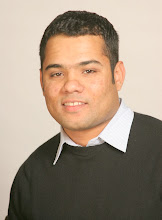Kevin Desouza: Small office, big impact
Recently I was interviewed by Peter Kelley of the University Week on the Institute of National Security Education and Research, my origins and research aspirations, and views of a range of topics from the current war on terror to the pursuit of inter-disciplinary research and building global citizens of the future.
The article can be found at: Desouza Feature [http://uwnews.washington.edu/ni/uweek/uweekarticle.asp?articleID=33905]
The abstract of the article:
“Kevin Desouza is an assistant professor in the Information School, adjunct faculty in electrical engineering and the director of the Institute for National Security Education and Research, a constant, a blogger and the author of seven books. Oh, and he’s 27 years old.”
For the full edition of University Week [24 (30), May 31, 2007 – Jun 20, 2007], see http://uwnews.org/uweek/uweekindex.asp
P.S. Thanks to Mary Levin for taking the photograph and spending countless hours fine tuning it...She does work miracles...







